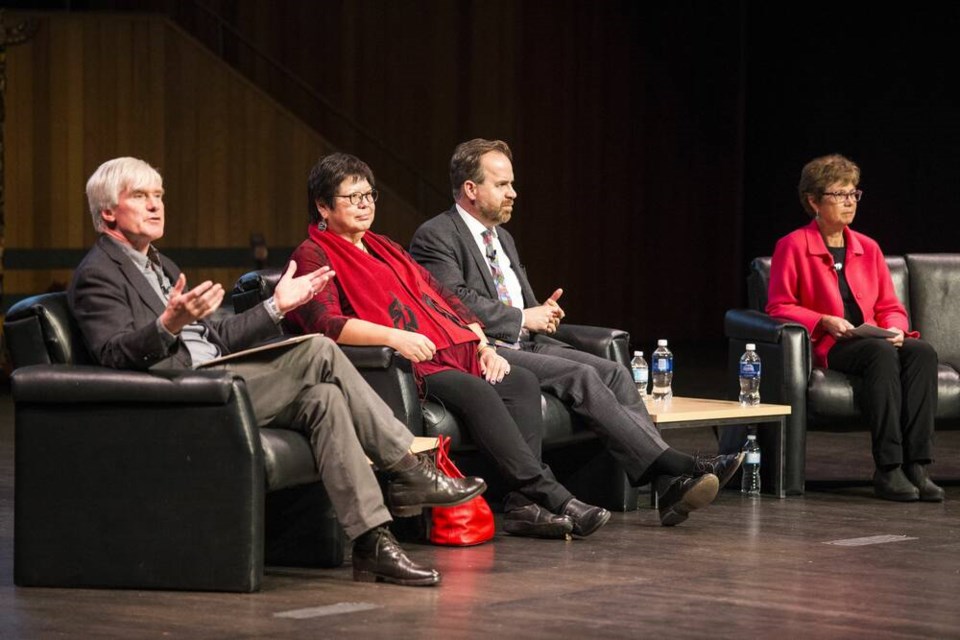On Aug. 24-26, the Victoria Forum will gather again at various locations in Greater Victoria to consider how to reorient our trajectory.

A commentary. Klein is executive director of the Victoria Forum and Freeman is president and CEO of Definity Foundation.
The headline above should not need any justification. In a world marked by deepening divides, whether political, economic or ecological, empathy should be recognized as essential to our shared future.
Yet, to our horror, even empathy itself is being questioned.
As Elon Musk remarked recently in a Joe Rogan podcast, “the fundamental weakness of Western civilization is empathy.”
It’s a sentiment that speaks volumes about the current moment.
From dismantling global aid to mocking public health efforts, such rhetoric reflects a broader worldview where power is concentrated, and responsibility is disparaged.
We are witnessing the rise of leaders and influencers who see empathy not as a virtue, but as a vulnerability, something to shed in their pursuit of dominance.
This trend of empathy erosion has a name. TheEconomist’s word of the year for 2024, “kakistrocacy,” refers to a system of government in which the least qualified or most unscrupulous individuals hold power. It captures a growing sense that our political institutions are under attack.
As Martin Luther King, Jr. warned, “Power without love is reckless and abusive, and love without power is sentimental and anemic.” Our challenge now is to rid ourselves of the former without succumbing to the latter.
How did we get here?
For a long time, we believed that our systems just needed fixing, that they were broken or outdated. But we’ve come to realize something more unsettling.
These systems are not broken. Their negative outcomes are not bugs. They are features of the way they were designed. And they are producing exactly what they were incentivized to produce — environmental degradation, exclusion, concentration of wealth, and structural inequality.
To build a better future, it’s not enough to bridge divides, we must also reimagine the systems themselves. That takes more than policy reform. It takes collective imagination as a strategy to envision new ways of organizing our economies, our democracies, and our relationships with one another and the planet.
Imagination is not a luxury. It is a form of resistance against fatalism, and a catalyst for redesign.
Concentrations of wealth and influence have led to dangerous assumptions: that technological innovation alone can solve the world’s problems, that the negative consequences of our actions are someone else’s problems, and that profit is the ultimate measure of success.
The difficulty here is that immense wealth comes with enormous power but is often devoid of equivalent responsibility.
What is lacking is empathy; the humility to listen, the courage to act for the common good, and the ability to know what it is like to walk in another person’s shoes.
Empathy isn’t sentimental. It is structural. It is what allows diverse societies to thrive.
It is the bedrock of community, co-operation, and democracy. And it’s the foundation for bridge building — the kind of collective action we urgently need.
What now?
That’s where the Victoria Forum comes in. Created to foster dialogue across sectors and ideologies, the Forum convenes policy makers, Indigenous voices, academics, business leaders and civil society from across the world.
Its purpose is not to better appreciate our problems but to forge new solutions together and, in so doing, to develop ideas for a better world.
On Aug. 24-26, we will gather again at various locations in Greater Victoria to consider how to reorient our trajectory:
• By advancing economic justice through reconciliation and ensuring opportunities;
• By renewing democracy in the face of polarization and authoritarianism; and,
• By investing in inclusive and regenerative economies that serve people and planet.
As partners in convening the Victoria Forum we’ve seen how empathy, when made actionable, can move beyond sentiment and become a powerful tool for bridge building, renewal and systems change. Learn more about us at www.victoriaforum.ca.
While bridge building begins with empathy, it doesn’t stop there.
It requires spaces where difficult conversations can happen with courage, curiosity, and care.
It demands leadership that is both principled and imaginative. It calls on all of us, not just the wealthy, not just governments, to show up and shape the future.
We invite you to be part of this journey. Share your voice. Build new bridges. Reimagine what’s possible.
And remember that in the face of division and despair, empathy is not a weakness, it is our superpower!
>>> To comment on this article, write a letter to the editor:[email protected]